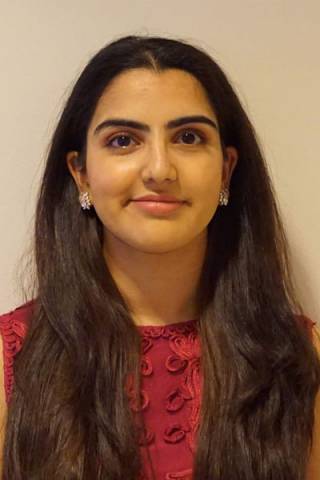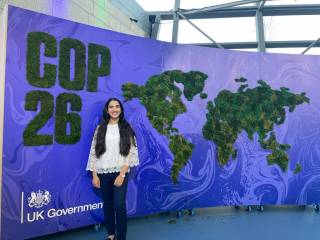Nikita Patel, Pharmacology

I didn’t actually know much about pharmacology; at school they taught us about pharmacy but not pharmacology. Then, when I was in Year 12, I managed to get a summer lab placement at Kingston University in the field of pharmacology. From there, I became really interested in the field and started to look up different courses and came across UCL.
I was interested in the Pharmacology course at UCL, and the course sat in the same department as Physiology and Neuroscience so I thought that it would provide me with a broad overview. UCL also does very well in the rankings and is London based. I’m from London and wanted to stay close to home, but far enough away that I could live out and be more independent!
I looked at the course content on the website and read all about the different modules and they really interested me. I also liked that in the later years of the course you could tailor the course to your interests.
Can you tell me about your experience studying in London?
So being in central London means that there is a lot going on, and I really enjoyed that, especially all of the different events that were organised by various UCL societies. Whilst at UCL I joined various societies including the Hindu society and the Indian society. My friends even convinced me to join the Economics and Finance society. Through the various events I had the opportunity to network which I really appreciated because I hadn’t really done much networking before, and I’ve realised what an important skill it is.
During the summers of my course I tried to seek out various placements. The department had a page to help with this which was really useful. During my first year I left it too late and a lot of places were already filled, so in subsequent years I started to look earlier.
I had the opportunity to undertake a summer placement at Imperial. I found this through UCL so I’m really grateful as I learned a lot of skills in that time. The placement lasted for approximately ten weeks and was looking at lung inflammation and how stem cells could be a potential therapeutic. I was also invited back the next summer to continue the project which was really nice and I could pick up from where I left off.
What is your favourite memory of UCL?
I’m not sure if it counts but I would say graduation. It felt like it was everything we’d been working towards over our four-year course, and it was great being able to celebrate with my cohort. I remember everyone was a bit worried about the weather because it was in September, but it was a really nice and sunny morning which just added to the feel of the day and the positive vibes!
I also really enjoyed Rangeela, a charity show organised by the Hindu society which had different categories of singing, dance, fashion etc. It was really nice to watch all those different performances from different groups – there is so much talent that’s at UCL.
Do you have any advice for current or prospective students?
Try to make the most of all the opportunities available, whether they’re specific to your course or not. For example, when I was looking at lab placements, I was also looking at volunteering opportunities. There are also positions within societies available.
I also really appreciated my role as a Student Ambassador at UCL because I’m interested in outreach and widening participation. Again, you get to meet a lot of different people, who you wouldn’t normally meet, and I found that really rewarding.
What have you been up to since graduating?
I graduated in September 2018, and then started my PhD at the William Harvey Research Institute at Queen Mary.
My PhD has been looking at new therapeutic approaches to trauma associated blood loss, which I know is a bit of a mouthful, but it's particularly focusing on the multiple organ failure aspect of things, because right now there's no cure for multiple organ failure.
I had an extension because of COVID as the labs were closed, but now I’m approaching the end of my PhD.
Whilst I’ve been doing my PhD, I’ve also done doing some volunteer work, because I think it’s important to try and inspire the next generation of scientists, and break down some of the stereotypes. My Student Ambassador work at UCL inspired me to do this as I met people from disadvantaged backgrounds who often saw that as a barrier to enter the science field, and this seemed like a nice transition.
I partnered with a local primary school and asked the students what they thought a scientist looked like. They would always say to me ‘an old, white man’, and I would say ‘well I’m none of those things.’ I just want to show children that you don’t need to come from a certain background or be a certain ethnicity to get into science.
What do you plan to do next?
I would like to stay in research and development, possibly within the pharmaceutical industry because I haven't ever worked in that environment before. I’m also considering a postdoctoral role in industry, so I would still have an academic link.

I entered the STEM for Britain competition back in March 2021 where you had to present your PhD work in a lay format and I won the Biological and Biomedical Sciences gold medal and the Physiological Society Prize.
The Society of Chemical Industry sponsored some of the awards at the STEM for Britain competition, and they watched some of the entries for the competition when looking for hosts. They thought that I would be a good fit as I was able to explain science in a lay format.
The event itself was showcasing some of the work that’s going on to try and combat climate change. A recent study found that 60% of young people feel overwhelmed by climate anxiety which is concerningly high, so it was really nice to hear about some of the projects, and for the audience to have their questions answered.
How do you think UCL has helped you with career or further studies to date?
I would say it’s made me more enthusiastic about science generally. The course itself, to the different lab placements, to meeting different people and the networking opportunities, it’s all really helped. Overall, I think it’s made me a better scientist generally and equipped me with many skills needed to undertake a PhD.
I also learnt a lot of skills through the Student Ambassador programme, especially communication skills. I was also a Summer School Leader which helped to develop my leadership skills.
Watch the COP26 event here: https://www.youtube.com/watch?v=i8Iw5F8XJ7w
Connect with Nikita on LinkedIn
 Close
Close

